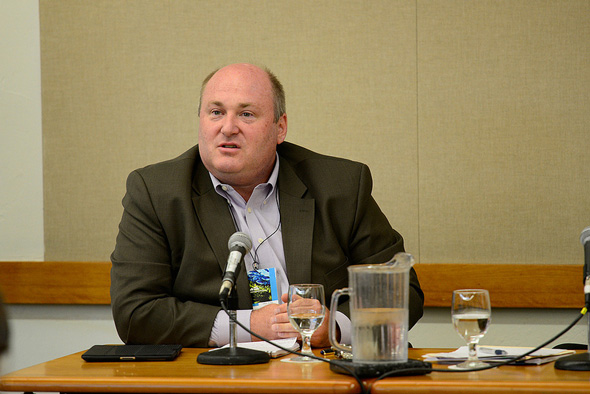ECSP Director
Geoff Dabelko was in Colorado last month to participate in the fifth annual
Aspen Environment Forum, a three-day series of discussions about some of the world’s most vexing environmental concerns, hosted jointly by the
Aspen Institute and
National Geographic. Dabelko took part in two panel discussions, considering recent efforts to “green” the U.S. military in one and addressing the nexus of climate change and conflict in the other.
The U.S. Department of Defense is currently pursuing an ambitious strategy to minimize its dependence on oil, aiming to produce 25 percent of its power from renewable energy sources by 2025. During the 75-minute “Is the Military a Model?” panel, Dabelko joined Sharon Burke of the Department of Defense, Sherri Goodman of CNA, and U.S. Army Major General Joseph Anderson to discuss the extent to which the military’s embrace of more efficient and alternative technologies can spur wider innovation and adoption. Many have previously cited the military’s role in developing technologies like the Global Positioning System and the internet as a reason for optimism in this regard.
The “Climate and Conflict” panel, meanwhile, addressed how and to what degree climate change might affect future conflicts. According to Scientific American, “the consensus was that climate change per se will not cause conflict, armed or otherwise, but will exacerbate existing conflicts and instabilities.”
This was Dabelko’s third trip to the Aspen Environment Forum, and he spoke enthusiastically about the event in a brief interview with genConnect, which was covering the event. “The experience has been excellent,” he remarked, highlighting the diversity of participants as one of the forum’s greatest strengths.
Dabelko acknowledged that much work remains to be done to achieve environmental and energy-related goals, but praised the realistic and grounded approach of attendees: “We have a tremendous set of challenges, and we’re not yet really succeeding in addressing them. So there’s a self-reflection that what we’ve been doing isn’t necessarily getting us where we want to get, and so we have to find ways to do things differently.”
One way to improve, according to Dabelko, is to work on communications. “[We need to have] conversations about complex issues, [and we] need to understand how to make them more accessible and more simple. But ‘simple’ does not mean ‘dumb’ or ‘incorrect’…we need to get smarter about how to have these conversations with wider and [more] diverse audiences.”
Photo Credit: Geoff Dabelko, courtesy of the Aspen Institute. Video: genConnect.

 A Publication of the Stimson Center.
A Publication of the Stimson Center.




